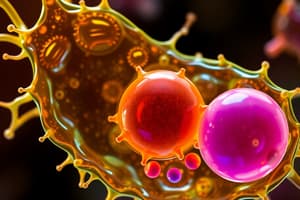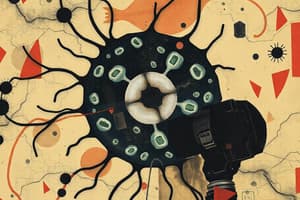Podcast
Questions and Answers
What is the primary function of ribosomes?
What is the primary function of ribosomes?
- Produce adenosine triphosphate
- Transport lipids
- Synthesize proteins (correct)
- Store genetic material
Which organelle is responsible for processing and packaging proteins and lipids?
Which organelle is responsible for processing and packaging proteins and lipids?
- Chloroplast
- Endoplasmic Reticulum
- Ribosome
- Golgi Apparatus (correct)
What is the role of mitochondria in the cell?
What is the role of mitochondria in the cell?
- Formation of cell wall
- Energy production (correct)
- Photosynthesis
- Synthesis of proteins
Which of the following best describes the function of lysosomes?
Which of the following best describes the function of lysosomes?
What distinguishes prokaryotes from eukaryotes?
What distinguishes prokaryotes from eukaryotes?
What is the basic unit of life?
What is the basic unit of life?
Which scientist is known for disproving the Theory of Spontaneous Generation?
Which scientist is known for disproving the Theory of Spontaneous Generation?
What characteristic distinguishes prokaryotic cells from eukaryotic cells?
What characteristic distinguishes prokaryotic cells from eukaryotic cells?
What is the jelly-like substance that fills a cell called?
What is the jelly-like substance that fills a cell called?
What does the Cell Theory state regarding cells?
What does the Cell Theory state regarding cells?
Which of the following is NOT a component of the Cell Theory?
Which of the following is NOT a component of the Cell Theory?
Which statement best describes a eukaryotic cell's genetic material?
Which statement best describes a eukaryotic cell's genetic material?
What is one of the purposes of understanding Cell Theory?
What is one of the purposes of understanding Cell Theory?
Flashcards
Ribosomes
Ribosomes
A small organelle found in both prokaryotic and eukaryotic cells responsible for protein synthesis.
Endoplasmic Reticulum
Endoplasmic Reticulum
A network of membranes within a eukaryotic cell that processes and transports newly synthesized materials.
Mitochondria
Mitochondria
A double-membrane bound organelle that is the powerhouse of a cell, responsible for producing energy in the form of ATP through cellular respiration.
Cell Wall
Cell Wall
Signup and view all the flashcards
Lysosomes
Lysosomes
Signup and view all the flashcards
Cell
Cell
Signup and view all the flashcards
Organelles
Organelles
Signup and view all the flashcards
Theory of Spontaneous Generation
Theory of Spontaneous Generation
Signup and view all the flashcards
Biogenesis
Biogenesis
Signup and view all the flashcards
Cytoplasm
Cytoplasm
Signup and view all the flashcards
Nucleus
Nucleus
Signup and view all the flashcards
Cell Membrane
Cell Membrane
Signup and view all the flashcards
Organisms
Organisms
Signup and view all the flashcards
Study Notes
Cell Theory
- Cell – basic unit of life, involves all processes to sustain life
- Organelles – sub-cellular components of cells
- Levels of Cells
- Tissue – group of similar cells
- Organs – group of different tissues with specific functions
- Organ System – organs working together
- Organism – biological product composed of cells, tissues, and organs
- Theory of Spontaneous Generation – living things arise from non-living matter; disproven
- Scientists
- Francisco Redi – disproved spontaneous generation through experiment
- Robert Hooke – coined the term "cell"
- Antonie van Leeuwenhoek – discovered micro-organisms (animalcules)
- Matthias Schleiden – discovered plant cells
- Theodor Schwann – discovered animal cells
- Rudolf Virchow – proposed that cells come from other cells (omnis cellula e cellula)
- Cell Theory
- Organisms composed of one or more cells
- Cell is the basic unit of life, performing life processes
- Cells come from pre-existing cells
- Contains Deoxyribonucleic Acid (hereditary information passed during cell division)
- Same chemical composition and metabolic activities
Cell Structure
- Cell Membrane – controls substance entry/exit; separates internal/external environment; composed of water, salts, enzymes
- Cytoplasm – jelly-like substance; medium for reactions
- Nucleus – houses genetic material; contains pores
- Ribosomes – synthesize proteins
- Endoplasmic Reticulum – processes, and transports new materials
- Rough ER synthesizes proteins
- Smooth ER synthesizes lipids
- Golgi Apparatus – processes, modifies, and packages proteins and lipids
- Mitochondria – energy-producing organelles; produce Adenosine Triphosphate (ATP)
- Cytoskeleton – structural support; maintains cell shape; moves and transports cell components
- Vacuoles – storage and transport
- Cell Wall (plants) – rigid wall made of cellulose, pectin, and hemicellulose; provides support
- Chloroplasts (plants) – responsible for photosynthesis; contain chlorophyll to convert solar to chemical energy, produces oxygen and glucose
- Lysosomes– membrane-bound organelles with digestive enzymes, break down waste materials and cellular debris
Prokaryotes and Eukaryotes
- Prokaryotes:
- "Pro" – before; "Karyo" – nucleus
- Lack a true nucleus and membrane-bound organelles
- Example: Archaea and Bacteria
- Eukaryotes:
- "Eu" – true; "Karyo" – nucleus
- Have a nucleus and membrane-bound organelles
- Examples: Fungi, Animals, Plants
Cell Cycle
- Organisms reproduce and have heredity; variation exists among offspring
- Genetics is studying heredity and variation
- Life continuity is dependent on reproduction and division of cells
- Cell division means new cells arise from pre-existing cells; multicellular organisms originate from a zygote
Studying That Suits You
Use AI to generate personalized quizzes and flashcards to suit your learning preferences.




